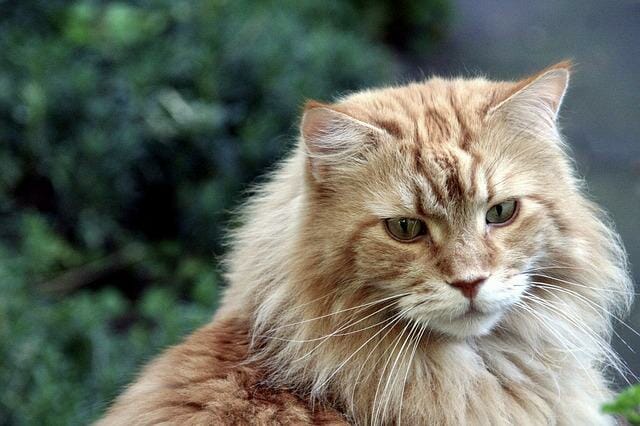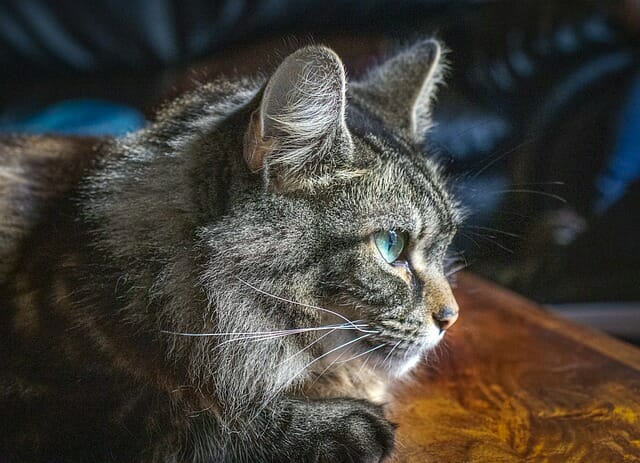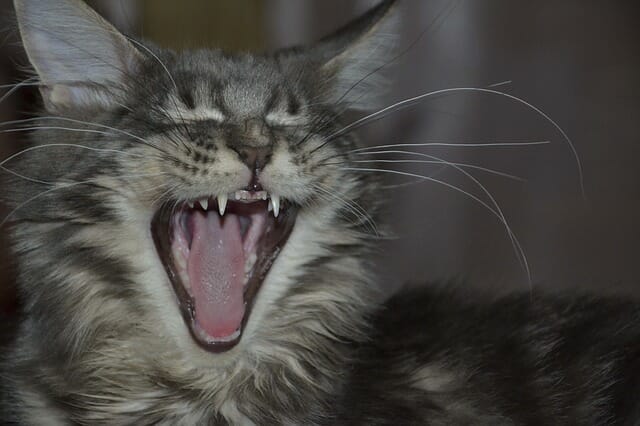Are Maine Coon Cats Aggressive: Signs and Causes of Aggressive Behavior, and How to Deal With It
No, Maine Coon cats are not generally aggressive. They are known for their friendly and pleasant personalities. They are intelligent and affectionate cats that enjoy spending time with their owners and are generally good with children and other pets. However, like any cat breed, Maine Coons may exhibit aggressive behavior in certain situations. This could be due to fear, anxiety, lack of socialization, overstimulation, or pain or discomfort.


Table of Contents
Signs of Aggression of Maine Coon
Hissing, Growling, and Yowling
Hissing, growling, and Yowling is vocal signs of aggression that a Maine Coon cat may exhibit. Cats typically use these vocalizations to express discomfort or fear, and they can be a warning sign that a cat is feeling threatened or anxious.
Hissing is a common sign of aggression in cats if they feel threatened, according to PetMD, typically accompanied by an arched back, raised fur, and dilated pupils. Growling is another vocalization often associated with cat aggression and is a warning sign that a cat is feeling threatened or uncomfortable. Conversely, Yowling is a more intense vocalization that cats often use to express pain or discomfort.
If your Maine Coon cat is hissing, growling, or yowling, it’s important to approach them cautiously and try to identify the cause of their behavior. This may involve removing perceived threats or sources of anxiety, providing your cat with more attention or socialization, or changing its environment to make them feel more comfortable.
Staring and Dilated Pupils
Staring and dilated pupils can be signs of aggression in Maine Coon cats. Dilated pupils are a natural response to stress or fear, indicating that a cat feels anxious or threatened. When a cat feels threatened, it may stare intently at its perceived threat, dilating its pupils to show dominance or warn of the threat.
It’s important to approach a Maine Coon cat cautiously if you notice them staring and with dilated pupils. Avoid making direct eye contact and give them plenty of space to retreat if they feel threatened. If your Maine Coon cat is displaying this behavior, it may be a sign that they are feeling stressed or anxious, and it’s important to identify the cause of its behavior and address it as soon as possible.
Ears Flattened Back
Flattened back ears indicate aggression or fear in Maine Coon cats. When a Maine Coon cat’s ears are flattened back against its head, it can indicate that they are feeling threatened or uncomfortable.
Cats have highly expressive ears to communicate their mood and intentions. When a cat’s ears are flattened back, they try to protect them from a perceived threat. This can be a warning sign that a Maine Coon cat feels stressed or anxious and may become aggressive if they feel cornered or threatened.
If you notice your Maine Coon cat’s ears are flattened back, it’s important to give them plenty of space and avoid making sudden movements that could further stress them out. It may also be helpful to identify the cause of their stress or anxiety, which could be anything from changes in their environment to a lack of socialization or exposure to other animals.
Swatting and Clawing
Swatting and clawing are common signs of aggression in Maine Coon cats. When a cat feels threatened or anxious, it may lash out with its paws and claws to defend itself or warn off a perceived threat.
Swatting is a warning sign that a Maine Coon cat feels uncomfortable or threatened. It may involve a quick swipe with their paw, without using their claws, to tell someone or something to back off. On the other hand, clawing involves using a cat’s claws and can be more dangerous, potentially causing injury or damage to furniture or other objects.
If your Maine Coon cat is swatting or clawing, it’s important to approach them cautiously and try to identify the cause of their behavior. This may involve removing perceived threats or sources of anxiety, providing your cat with more attention or socialization, or changing its environment to make them feel more comfortable.
Bared Teeth
Bared teeth can be a sign of aggression in Maine Coon cats. When a cat bares their teeth, it is a warning signal that it may become aggressive if the perceived threat continues.
Other signs of aggression, such as hissing, growling, and flattened ears, can accompany bared teeth. If you notice your Maine Coon cat baring their teeth, it’s important to approach them cautiously and try to identify the cause of its behavior.
Some common causes of stress or anxiety in Maine Coon cats include environmental changes, lack of socialization or attention, pain or discomfort, or exposure to other animals. Therefore, removing any perceived threats is important as providing your cat plenty of space to retreat if they feel threatened.
Tail Twitching and Flicking
Tail twitching and flicking can indicate aggression in Maine Coon cats. A cat’s tail twitching or flicking is often a sign of heightened arousal or agitation. This can be a warning signal that the cat may become aggressive if the perceived threat continues.
Other signs of aggression, such as hissing, growling, and bared teeth, can accompany tail twitching and flicking. If you notice your Maine Coon cat’s tail twitching or flicking, it’s important to approach them cautiously and try to identify the cause of their behavior.
Lunging and Biting
Maine Coon cats are known for their aggression and versatility in defending themselves. They may hiss, bite, growl, scratch, and strike out with their paws to defend themselves against threats. When threatened, Maine Coons can adopt either a defensive or offensive posture, depending on the situation.


Adequate cat care includes keeping cats indoors and away from outdoor spaces where they can escape. Additionally, cat owners must learn the warning signs of aggressive behavior to prevent an attack. Young children must be supervised around Maine Coon cats as they can annoy them. The best way to handle aggressive behavior in Maine Coon cats is with patience and understanding.
Common Causes of Maine Coon Aggression
Illness
Illness can also be a cause of aggression in Maine Coon cats. Cats that are in pain or discomfort may become aggressive as a way of protecting themselves or expressing their discomfort. This can be due to various underlying medical conditions, such as arthritis, dental problems, infections, or other health issues.
It’s important to take your Maine Coon cat to a veterinarian for a thorough physical examination if you notice any changes in their behavior, including aggression. In addition, your veterinarian can perform diagnostic tests to determine if your cat is experiencing any underlying medical issues and can recommend an appropriate treatment plan.
Over-Petting and Over-Grooming
Over-petting and over-grooming can also cause aggression in Maine Coon cats. While many cats enjoy being petted and groomed, it’s important to recognize when your cat has had enough. Over-stimulation can cause some cats to become over-aroused and agitated, leading to aggressive behavior.
To avoid over-stimulating your Maine Coon cat, it’s important to pay attention to their body language and signals. For example, if your cat starts twitching their tail, flattening their ears, or moving away from you, it may indicate they’ve had enough attention. Similarly, if you notice that your cat is grooming excessively, it may be a sign that they are feeling stressed or anxious.
Loneliness
Loneliness can also be a cause of aggression in Maine Coon cats. Like all cats, Maine Coons are social animals and thrive on companionship and interaction with their human family and other pets. If your Maine Coon cat is left alone for long periods, it may become bored, anxious, or lonely, leading to aggressive behavior.
To help prevent loneliness in your Maine Coon cat, it’s important to provide them with plenty of social interaction and stimulation. This can include playing with your cat, providing them with toys and puzzles, and engaging in regular grooming sessions.
If you are away from home for long periods, consider adopting another cat or pet to keep your Maine Coon company. This can give them social interaction and companionship to prevent loneliness and boredom.
Hormones
Hormones can also be a factor in aggressive behavior in Maine Coon cats. Intact (unneutered) male cats, in particular, can become aggressive due to the influence of testosterone. This can cause them to become territorial and protective of their home and family and may lead to aggressive behavior towards other animals and humans.
Neutering your male Maine Coon cat can help reduce the influence of hormones and prevent aggressive behavior. Female cats can also display aggression due to hormonal changes, particularly during mating season. Spaying your female Maine Coon can help reduce the impact of hormones and prevent aggressive behavior.
If your Maine Coon cat displays aggressive behavior due to hormonal factors, it’s important to work with a veterinarian or animal behaviorist to develop an appropriate treatment plan. This may include medication, hormone therapy, or behavior modification techniques.
Environmental Changes
Environmental changes can also trigger aggressive behavior in Maine Coon cats. Cats are creatures of habit and thrive on routine and predictability. Sudden changes in their environment, such as moving to a new home, introducing a new pet or family member, or changing their daily routine, can cause stress and anxiety, leading to aggressive behavior.


To help prevent environmental triggers for aggression, it’s important to make changes gradually and give your Maine Coon cat plenty of time to adjust. For example, if you’re moving to a new home, consider bringing your cat’s familiar bedding, toys, and other items to help them feel more comfortable in their new surroundings.
When introducing a new pet or family member, it’s important to do so slowly and carefully, providing your Maine Coon with plenty of time to get used to the new arrival. You may also need to provide each pet with separate living spaces and resources to prevent territorial disputes and reduce the risk of aggressive behavior.
Tips to Keep Your Maine Coon Calm and Relaxed
- Provide plenty of socialization and playtime: Maine Coon cats are social animals and need plenty of interaction with their owners to stay happy and relaxed. Make sure to spend time playing with your cat daily, providing plenty of toys and opportunities for play.
- Provide a comfortable and safe living environment: Make sure your Maine Coon cat has a comfortable bed, plenty of toys, and access to clean water and food. Provide a litter box in a quiet location and ensure it’s cleaned regularly. Also, ensure your cat has access to a scratching post or pad to help satisfy their natural urge to scratch.
- Provide a healthy diet: A healthy diet is essential for your Maine Coon’s physical and mental well-being. Make sure to provide high-quality cat food and avoid overfeeding or underfeeding.
- Provide plenty of opportunities for exercise: Maine Coon cats are active and athletic and need plenty of opportunities for exercise to stay healthy and relaxed. Provide plenty of toys and scratching posts, and consider providing outdoor space or a cat tree for climbing and exploring.
- Keep your cat’s environment calm and peaceful: Maine Coon cats are sensitive to changes and can become stressed or anxious in loud or chaotic environments. Provide a calm and peaceful living space, avoiding loud noises or sudden changes.
- Consider calming aids: If your Maine Coon cat is prone to anxiety or stress, consider using calming aids such as pheromone sprays or diffusers, natural remedies like chamomile or valerian root, or medication prescribed by your veterinarian.
